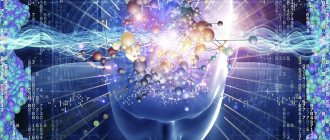You can “reflash” any brain. All thanks to neuroplasticity - the ability to change under the influence of experience. And yes, the title is clickbait. There are no born “humanities” and “techies”, there is only laziness. We have already told you how to develop logical thinking. This article contains some more tips.
What is logical thinking?
To explain what “logical thinking” is, let’s divide this concept into two parts: thinking and logic. Now let's define each of these components.
Human thinking is a mental process of processing information and establishing connections between objects, their properties or phenomena of the surrounding world. Thinking allows a person to find connections between the phenomena of reality, but in order for the connections found to truly reflect the true state of affairs, thinking must be objective, correct or, in other words, logical, that is, subject to the laws of logic.
Logic translated from Greek has several meanings: “the science of correct thinking”, “the art of reasoning”, “speech”, “reasoning” and even “thought”. In our case, we will proceed from the most popular definition of logic as a normative science about the forms, methods and laws of human intellectual mental activity. Logic studies ways to achieve truth in the process of cognition in an indirect way, not from sensory experience, but from knowledge acquired earlier, therefore it can also be defined as the science of ways to obtain inferential knowledge. One of the main tasks of logic is to determine how to come to a conclusion from existing premises and gain true knowledge about the subject of thought in order to gain a deeper understanding of the nuances of the subject of thought being studied and its relationships with other aspects of the phenomenon under consideration.
Now we can define logical thinking itself.
Logical thinking is a thought process in which a person uses logical concepts and constructions, which is characterized by evidence, prudence, and the goal of which is to obtain a reasonable conclusion from existing premises.
There are also several types of logical thinking; we list them, starting with the simplest:
1
Figurative-logical thinking
Figurative-logical thinking (visual-figurative thinking) - various thought processes of the so-called “figurative” problem solving, which involves a visual representation of the situation and operating with images of its constituent objects. Visual-figurative thinking, in fact, is synonymous with the word “imagination”, which allows us to most vividly and clearly recreate the whole variety of different actual characteristics of an object or phenomenon. This type of human mental activity is formed in childhood, starting from approximately 1.5 years.
To understand how developed this type of thinking is in you, we suggest you take the IQ Test “Raven’s Progressive Matrices”
The Raven's Test is a progressive matrix scale for assessing IQ, mental ability, and logical thinking, developed in 1936 by John Raven and Roger Penrose. This test can give the most objective assessment of the IQ of the people being tested, regardless of their level of education, social class, type of activity, linguistic and cultural characteristics. That is, it can be said with a high probability that the data obtained as a result of this test from two people from different parts of the world will evaluate their IQ equally. The objectivity of the assessment is ensured by the fact that this test is based solely on images of figures, and since Raven's matrices are among non-verbal intelligence tests, its tasks do not contain text.
The test consists of 60 tables. You will be offered drawings with figures connected to each other by a certain relationship. One figure is missing; it is given at the bottom of the picture among 6-8 other figures. Your task is to establish a pattern that connects the figures in the picture and indicate the number of the correct figure by choosing from the proposed options. Each series of tables contains tasks of increasing difficulty, at the same time, the complication of the type of tasks is observed from series to series.
Statistics Full screen
2
Abstract logical thinking
Abstract-logical thinking is the performance of a thought process using categories that do not exist in nature (abstractions). Abstract thinking helps a person model relationships not only between real objects, but also between abstract and figurative ideas that thinking itself has created. Abstract logical thinking has several forms: concept, judgment and inference, which you can learn more about in the lessons of our training.
3
Verbal and logical thinking
Verbal-logical thinking (verbal-logical thinking) is one of the types of logical thinking, characterized by the use of linguistic means and speech structures.
This type of thinking requires not only the skillful use of thought processes, but also competent command of one’s speech. We need verbal-logical thinking for public speaking, writing texts, arguing, and in other situations where we have to express our thoughts using language.
Applying logic
Thinking using the tools of logic is necessary in almost any area of human activity, including the exact sciences and humanities, economics and business, rhetoric and public speaking, the creative process and invention. In some cases, strict and formalized logic is used, for example, in mathematics, philosophy, and technology. In other cases, logic only provides a person with useful techniques for obtaining a reasonable conclusion, for example, in economics, history, or simply in ordinary “life” situations.
As already mentioned, we often try to think logically on an intuitive level. Some people do it well, some do it worse. But when connecting the logical apparatus, it is better to know exactly what mental techniques we use, since in this case we can:
- More precisely, choose the right method that will allow you to come to the right conclusion;
- Think faster and better – as a consequence of the previous point;
- It is better to express your thoughts;
- Avoid self-deception and logical fallacies,
- Identify and eliminate errors in other people’s conclusions, cope with sophistry and demagoguery;
- Use the necessary argumentation to convince your interlocutors.
Components of logical thinking
The use of logical thinking is often associated with quickly solving logic tasks and passing tests to determine the level of intellectual development (IQ). But this direction is associated to a greater extent with bringing mental operations to automatism, which is a very insignificant part of how logic can be useful to a person.
The ability to think logically combines many skills in the use of various mental actions and includes:
- Knowledge of the theoretical foundations of logic.
- The ability to correctly perform such mental operations as: classification, specification, generalization, comparison, analogy and others.
- Confident use of key forms of thinking: concept, judgment, inference.
- The ability to argue your thoughts in accordance with the laws of logic.
- The ability to quickly and effectively solve complex logical problems (both educational and applied).
Of course, such operations of thinking using logic as definition, classification and categorization, proof, refutation, inference, conclusion and many others are used by every person in his mental activity. But we use them unconsciously and often with errors, without a clear idea of the depth and complexity of those mental actions that make up even the most elementary act of thinking. And if you want your logical thinking to be truly correct and rigorous, you need to learn this specifically and purposefully.
How to learn this?
Logical thinking is not given to us from birth, it can only be learned. There are two main aspects of teaching logic: theoretical and practical.
Theoretical logic
, which is taught at universities, introduces students to the basic categories, laws and rules of logic.
Practical training
aimed at applying the acquired knowledge in life. However, in reality, modern teaching of practical logic is usually associated with passing various tests and solving problems to test the level of intelligence development (IQ) and for some reason does not address the application of logic in real life situations.
To truly master logic, you need to combine theoretical and applied aspects. Lessons and exercises should be aimed at developing intuitive, automated logical tools and consolidating the acquired knowledge in order to apply it in real situations.
Based on this principle, the online training that you are reading now was compiled. The purpose of this course is to teach you to think logically and apply logical thinking techniques. Classes are aimed at introducing the basics of logical thinking (thesaurus, theories, methods, models), mental operations and forms of thinking, rules of argumentation and laws of logic. In addition, each lesson contains tasks and exercises to train you to use the acquired knowledge in practice.
Logic lessons
Having collected a wide range of theoretical materials, as well as having studied and adapted the experience of teaching applied forms of logical thinking, we have prepared a series of lessons for the full mastery of this skill.
Lesson 1. Logical analysis of language
We will devote the first lesson of our course to a complex but very important topic - the logical analysis of language. It’s worth mentioning right away that this topic may seem abstract to many, loaded with terminology, and inapplicable in practice. Don't be scared! Logical analysis of language is the basis of any logical system and correct reasoning. The terms that we learn here will become our logical alphabet, without knowledge of which we simply cannot go further, but gradually we will learn to use it with ease.
Lesson 2. Concept in logic
A logical concept is a form of thinking that reflects objects and phenomena in their essential features. Concepts come in different types: concrete and abstract, individual and general, collective and non-collective, irrespective and correlative, positive and negative, and others. Within the framework of logical thinking, it is important to be able to distinguish these types of concepts, as well as produce new concepts and definitions, find relationships between concepts and perform special actions on them: generalization, limitation and division. You will learn all this in this lesson.
Lesson 3. Definition in logic
In the first two lessons, we talked about how the task of logic is to help us move from an intuitive use of language, accompanied by errors and disagreements, to a more orderly use of it, devoid of ambiguity. The ability to handle concepts correctly is one of the skills required for this. Another equally important skill is the ability to correctly define. In this lesson we will tell you how to learn this and how to avoid the most common mistakes.
Lesson 4. Logical reasoning
Logical judgment is a form of thinking in which something is affirmed or denied about the surrounding world, objects, phenomena, as well as relationships and connections between them. Judgments in logic consist of a subject (what the judgment is about), a predicate (what is said about the subject), a copula (what connects the subject and the predicate) and a quantifier (the scope of the subject). Judgments can be of various types: simple and complex, categorical, general, particular, individual. The forms of connectives between the subject and the predicate also differ: equivalence, intersection, subordination and compatibility. In addition, within the framework of composite (complex) judgments there can be their own connectives, which define six more types of complex judgments. The ability to think logically presupposes the ability to correctly construct various types of judgments, understand their structural elements, features, relationships between judgments, and also check whether a judgment is true or false.
Lesson 5. Laws of logic
Before moving on to the last third form of thinking (inference), it is important to understand what logical laws exist, or, in other words, objectively existing rules for constructing logical thinking. Their purpose, on the one hand, is to help build inferences and argumentation, and on the other hand, to prevent errors and violations of logic associated with reasoning. This lesson will examine the following laws of formal logic: the law of identity, the law of excluded middle, the law of contradiction, the law of sufficient reason, as well as De Morgan's laws, the laws of deductive inference, Clavius' law and the laws of division. By studying examples and completing special exercises, you will learn how to purposefully use each of these laws.
Lesson 6. Inference
Inference is the third form of thinking in which from one, two or more propositions, called premises, a new proposition, called a conclusion or conclusion, follows. Inferences are divided into three types: deductive, inductive and analogical inferences. In deductive inference (deduction), a conclusion is drawn from a general rule for a particular case. Induction is inference in which a general rule is derived from several particular cases. In inferences by analogy, based on the similarity of objects in some characteristics, a conclusion is drawn about their similarity in other characteristics. In this lesson you will become familiar with all types and subtypes of inferences and learn how to build various cause-and-effect relationships.
Lesson 7. Syllogisms
This lesson will focus on multi-premise inferences. Just as in the case of single-premise conclusions, all the necessary information in a hidden form will already be present in the premises. However, since there will now be many premises, the methods for extracting them become more complex, and therefore the information obtained in conclusion will not seem trivial. In addition, it should be noted that there are many different types of multi-premise inferences. We will focus only on syllogisms. They differ in that both in the premises and in the conclusion they have categorical attributive statements and, based on the presence or absence of some properties in objects, they allow one to draw a conclusion about the presence or absence of other properties in them.
Lesson 8. Types of reasoning
In previous lessons we talked about various logical operations that form an important part of any reasoning. Among them were operations on concepts, definitions, judgments and inferences. This means that at this point it should be clear what components the reasoning consists of. However, we have not yet touched upon the questions of how reasoning as a whole can be organized and what types of reasoning there are in principle. This will be the topic of the last lesson. Let's start with the fact that reasoning is divided into deductive and plausible. All types of inferences discussed in previous lessons: inferences using a logical square, appeals, syllogisms, enthymemes, sorites, are precisely deductive reasoning. Their distinctive feature is that the premises and conclusions in them are connected by a relation of strict logical consequence, while in the case of plausible reasoning there is no such connection. First, let's talk more about deductive reasoning.
Workout
The development of creative thinking and logic is only possible if the mind is accustomed to working in different directions. The development of logical thinking needs to be trained, here are some practical tips:
- Studying Natural Sciences
Take up the study of science close to your spirit, which you have been putting off. Physics, chemistry or history, other exact sciences perfectly stimulate flexibility of thinking. They teach how to build cause-and-effect chains.
- Use reasoned argument
Instead of the standard desire to answer “because I’m in charge” or “it’s necessary,” try to convey your point of view to your opponent without emotions, constructively. Use logical as well as creative thinking, there can be a huge variety of dialogue options, get rid of the usual phrases and reactions. Particularly interesting is the way of leading the interlocutor to the necessary conclusion through indirect statements with which he initially agrees.
- Play chess, backgammon, checkers and card games
This is an amazing opportunity to develop logical thinking. After all, there is training in cause-and-effect relationships, calculating the opponent’s moves in advance. One is trained to learn lessons even from defeats. Thus, a person gradually removes negative thinking from his life.
- Find other ways to use items
This exercise promotes excellent development of creative thinking in adults. Choose one item, be it a box of matches or a stool. And find all possible ways to use the item for other purposes than its intended purpose. You can count matches, lay out drawings, and use a stool as a stand for a Christmas tree. Get creative.
- Association game
Use opposite meanings to emerging associations for specific words. Let's say hard wool, soft glass, hot ice. This helps our brain tune in to a different mindset and remove negative thinking.
- Read books from the end
In addition to the understandable difficulties in completing this task, there are also nuances. Our brain is accustomed to the fact that resolution can only come when specific actions are taken. But both in life and in books, this is not always true. Sometimes the most unexpected events lead to results that were not intended. A gradual transition from the denouement to the preface will help debunk your guesses and learn an abstract vision of the situation, and also develop mobility and flexibility of thinking.
- Expand your vocabulary
When you hear an unfamiliar word, look up its meaning in the dictionary. And also: what is the history of origin, original meaning and use now. This will help you look at the world in a more multifaceted way.
- Words backwards
When in transport or on the street, read signs backwards. It will be very difficult. At first, you will only get short words, and then you will master the ability to read entire phrases! This is a great brain workout that shows there are alternatives. And, once in a problematic situation, it will be easier to see other options.
- Invent something that doesn't exist
The exercise is to come up with an animal or object, a name that does not exist in nature. Leopard or birdfox, for example. And imagine or depict all this in detail. The point is that it is very difficult to invent something that does not exist. The brain still tries to reduce everything to familiar forms, especially in adults.
Sometimes negative thinking takes over, and it becomes difficult to complete a task that seems absurd. The ability to abstract from familiar forms and concepts, concentrate on still little-studied facts, and create fundamentally new things will be useful in any profession.
- Solve anagrams
You need to make a word from the mixed letters. Develops the ability to quickly find hidden meaning and see meanings that are incomprehensible at first glance.
- Use your other hand
If you are right-handed - left, if vice versa - right. Change your hand while performing everyday tasks. This stimulates both hemispheres, improving concentration, activating new neural connections, thus stimulating logical and creative thinking.
How to take classes?
The lessons themselves with all the exercises can be completed in 1-3 weeks, having mastered the theoretical material and practiced a little. But to develop logical thinking, it is important to study systematically, read a lot and constantly train.
For maximum effect, we recommend that you first simply read all the material, spending 1-2 evenings on it. Then take 1 lesson daily, doing the necessary exercises and following the suggested recommendations. After you have mastered all the lessons, engage in effective repetition using this technique to remember the material for a long time. Next, try to apply logical thinking techniques more often in life, when writing articles, letters, when communicating, in disputes, in business, and even in your leisure time. Reinforce your knowledge by reading books and textbooks, as well as using additional material, which will be discussed below.
How to develop ingenuity and intelligence
Many factors influence intelligence and ingenuity. If you are forced to subject your body to constant stress, then it is not surprising that your reactions will leave much to be desired. During peak periods, the human body produces cortisol, which has a detrimental effect on brain cells. If you have to take on a ton of things in the morning, then you should try to slow down your usual pace of life at least a little. Start by not jumping out of bed immediately after the alarm clock rings - allow yourself some time (15-25 minutes) to lie down and think about the coming day.
Ways to improve your intelligence
Music.
Periodically take a break from the daily hustle and bustle by listening to music. By the way, scientists believe that classical works are very useful for activating the brain. For example, people who listen to Mozart from time to time are characterized by increased speed of thinking.
Don't waste energy.
Don't take on many tasks at once. To do something well, it is important to focus on it. If you have to answer a letter, talk on the phone and listen to the news at the same time, then, of course, attention will begin to dissipate among several sources of information. The result will be a decrease in concentration and even the level of intelligence.
More positive.
Do not deny yourself positive emotions - your performance directly depends on them. Visit parks more often, go to the movies, meet friends.
Development.
Regularly search the Internet for exercises to develop memory and enrich your vocabulary. It is unlikely that you will be “illuminated” by unexpected solutions if you have a poor vocabulary that is almost unable to hold anything in your head. To develop memory, learn poetry, just read books.
Books and textbooks on logic
On this page we have selected useful books and textbooks that will help you deepen your knowledge of logic and logical thinking:
- "Applied Logic".
Nikolai Nikolaevich Nepeyvoda; - "Textbook of Logic".
Georgy Ivanovich Chelpanov; - "Logic: lecture notes."
Dmitry Shadrin; - "Logics.
Training course" (educational and methodological complex). Dmitry Alekseevich Gusev; - “Logic for Lawyers” (collection of problems).
HELL. Getmanova; - "Logics.
Textbook for law schools." IN AND. Kirillov, A.A.Starchenko - "Logics.
Textbook for high school." Vinogradov S.N., Kuzmin A.F. - "Logics.
Textbook for humanities faculties." A.A.Ivin - "Logics".
Ivanov E.A. - And others.
What games will help develop logic?
There are several types of games that will help you develop your logic and have fun!
Chess
Chess is a game that is based on logical thinking. The player must think through his actions several steps ahead, otherwise he will never be able to win the game.
Have you ever tried to play chess, but never managed to become a winner? It's time to resume classes! Thanks to playing chess, you can not only develop or improve your analytical thinking, but also make new friends. Try to play with more advanced players, because this is the only way you can improve your level and learn something new.
Checkers
Many people believe that checkers is a simplified version of chess. If you can’t win a chess game yet, then you can start with checkers! The rules of this game are extremely simple, but you still have to think carefully to become a winner.
Some world-famous chess players admit that they started with checkers because at first they could not comprehend the basics of chess art and confused the rook with the queen. So buy this board game, which is interesting not only for adults, but also for children, and start playing! Or play online with different people! This way you can not only develop logic, but also find like-minded people all over the world.
Reversi
If it is still difficult for you to play chess, and checkers does not attract you, then the best option for you is the relatively young game of reversi (another name is Othello), which is becoming more and more popular among young people every day. Buy the board version of the game or play online!
Backgammon
Another great game that has a positive effect on the development of analytical thinking and allows you to relax after a hard day at work. To win, you need to roll the dice and move the checkers so that you can go a full circle around the board faster than your opponent and be the first to get the checkers into the “house”.
Backgammon is a very interesting game with an equally interesting history. There are two varieties of the game: short and long backgammon. Choose the one you like best and start the game! It should be noted that backgammon develops not only logic, but also helps improve mental counting skills.
Puzzles, puzzles, scanwords, crosswords, sudoku
Many people think that crosswords, Sudoku, scanwords, puzzles, and puzzles are children's entertainment, which is completely undignified for an adult to pay attention to. But this statement is not true! They are great for developing logic and intelligence.
Associations
Take the first word that comes to your mind and try to find as many associations to it as possible. You can play either alone or with a group of friends.
Scrabble
The goal of the game is to form words from the available letters. The game is somewhat reminiscent of our “Erudite”, but with more loyal rules. Scrabble develops memory, logic, and broadens one's horizons.
Interesting exercises for developing logic
Anagrams
Solving anagrams is a fun and rewarding pastime. An anagram is a word in which the letters are rearranged in random order. To solve an anagram, you need to know the original word. For example, YATSKFTEIDNIIAI (identification), OYaTRKS (brightness), ESCONL (sun).
Special problems
Logic puzzles will lift your spirits and help develop analytical thinking. Look for them on the Internet, buy collections (they are sold in bookstores). Start with easy puzzles and gradually increase the level.
Here is an example of an easy-level problem: “Petya shaves his beard every day, but the beard does not disappear from his face. Why?". Answer: “Petya’s profession is a barber, he shaves other people’s beards.”
Making puzzles, rebuses, crosswords
Tired of solving crosswords, puzzles, puzzles that other people came up with? It's time to do it yourself!
Search for alternatives
Finding alternative options helps develop logical thinking. Come up with 5 - 8 ways to use an object in an unusual way, 5 - 8 ways to get out of an abstract critical situation, 5 - 8 ways to ask to leave work early or ask for a salary increase.
Trainings
Training and development of logical thinking can be supplemented by the following trainings, which you can take for free on our website:
1. Memory and attention are important abilities for logical thinking, which will allow you to concentrate on a large number of mental objects on which logical operations are carried out.
2. Creative thinking together with logic will give you the opportunity not only to draw correct conclusions, but to look for non-standard solutions where logic has reached a dead end.
3. Oratory and writing skills form verbal and logical thinking, and also allow you to apply the acquired knowledge in practice in this course.
4. Mental arithmetic and speed reading are suitable for developing and training intellectual abilities.
5. Human psychology is useful in understanding logical thinking, because it is psychology as a science that studies mental operations, motives, and incentives of a person.
Concept
A concept is a form of thinking that designates an object or its property. Here are a few random concepts:
- tree
- smile
- telephone
- Sun
- molecule
- sandwich
- beauty
At the same time, you might think that the concept and the word are one and the same. After all, we express the concept of a child with the word child. However, a concept and a word are different things.
A concept is a mental designation of an object (a thought about it), and a word is only a linguistic expression of this thought. In other words, a concept is a form of thinking, and a word is a form of language.
The concept of a newborn is the same for all people in the world: it means a recently born person, and not a table, air or a pencil. But the verbal expression of this concept will be different in all languages.









